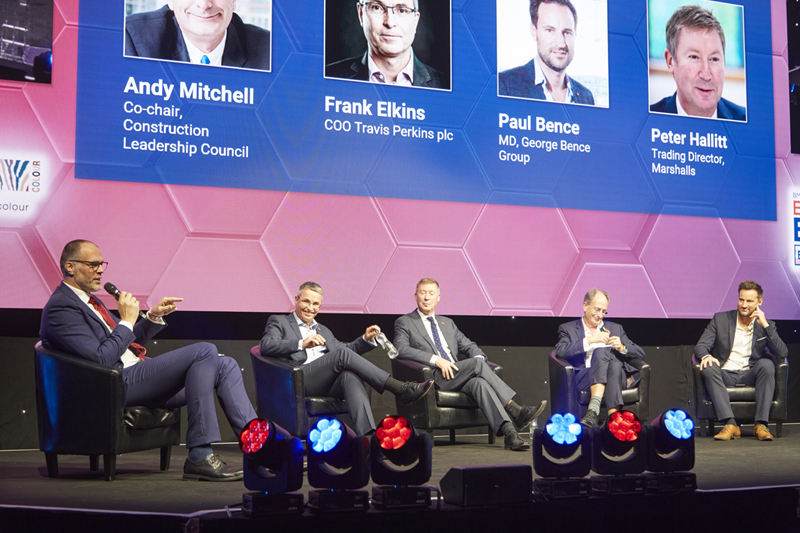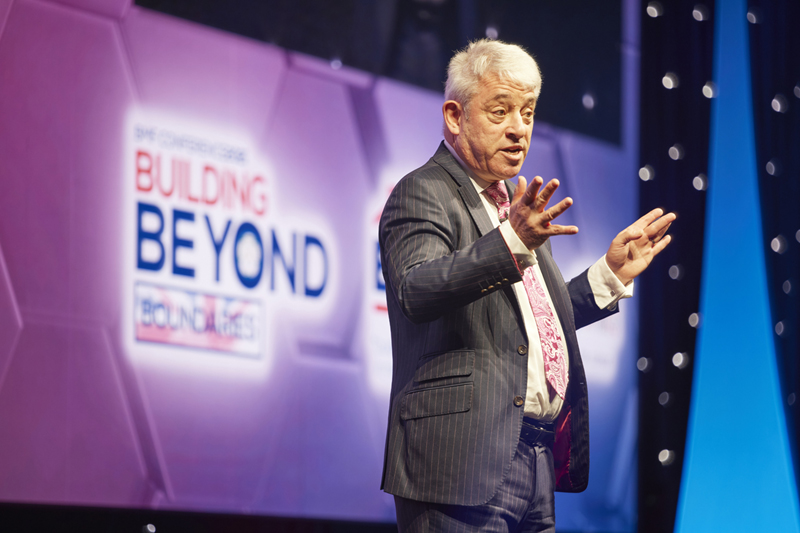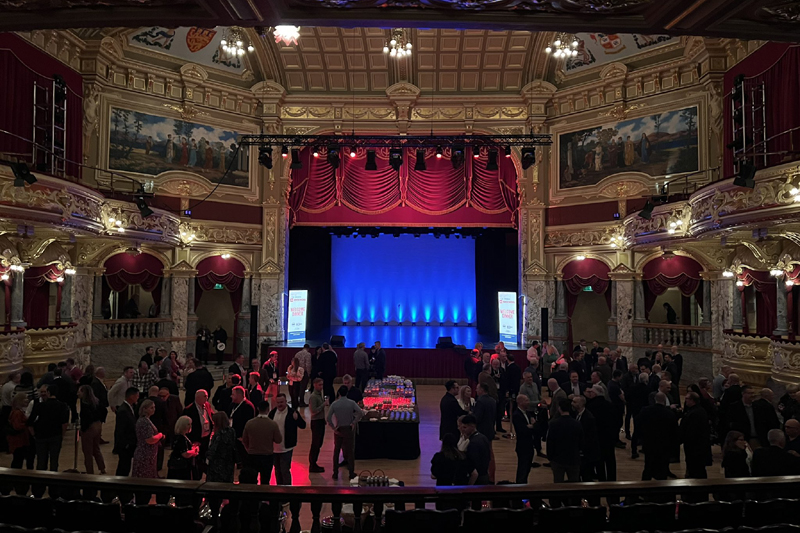
PBM reports back from Harrogate and York, following the first Builders Merchants Federation (BMF) Conference to be held in the UK for almost 30 years.
The lingering impact of Covid-19 was never far from the surface at this year’s BMF-hosted All Industry Conference. From the socially-distanced seating in the main Conference Hall to the hanger-like exhibition space allowing for the free circulation of fresh air, there were subtle reminders throughout that this was not quite ‘business as usual’.
Indeed, the simple fact the event took place in Yorkshire — rather than typically farther flung destinations such as Dubrovnik, Budapest or Malta — was illustrative of the adaptations we’ve all needed to make in our lives over the last 18 months. And of course, adapting to a ‘new normal’ was a central tenet of many of the presentations, workshops and even the more informal discussions which took place over the course of proceedings.
At least one speaker slot required a last minute substitution because of Covid, and a number of delegates questioned some of the (enforced?) changes to the format — many, for example, seemed to lament the omission of the traditional ‘Meet the Merchant’ networking platform.
However, as we have all had to do since March last year, there was a need to ‘make things work’. And more positively, the UK setting appeared to facilitate the attendance of a number of new faces who will hopefully take on board the mantra of BMF CEO John Newcomb that “the more you put into being a BMF member, the more you will get out.”
Indeed, John’s opening remarks outlined the work that had been done throughout the duration of the pandemic to acknowledge the merchant sector’s place as the fulcrum of the construction industry in the eyes of government and policy makers. The BMF’s position on the Construction Leadership Council, John explained, had been significant in raising the profile of merchanting by representing the interests and concerns of members through Covid and, crucially, into addressing the longer-term issues facing the sector.
Perhaps this was one of the key messages underlying the Conference theme of ‘Building Beyond Boundaries’. As BMF Chairman Richard Hill noted, through the CLC and evidenced by the merchant sector’s role in the nation’s construction-led recovery, it has emerged from the margins to secure “a seat at the top table” and Government “now understands the role of merchants and suppliers”.
From the current HGV driver shortages and turbulence in the supply chain to the ongoing challenges of skills, recruitment and — not least — the substantial matter of sustainability, this emerging influence is vital.
For the BMF itself, both John and Richard reiterated the organisation’s four key principles of delivering member value; supporting recruitment, training and professional development; supply chain collaboration; and industry representation at a political level. And for all the progress, the work continues — membership now stands at 770 with a goal of breaking the 1,000 mark, for example — in the face of the ongoing evolution of the merchant marketplace.

The two-day formal business sessions presented the perspectives of a vibrant line-up of speakers from both within the industry and the wider business world. Marketing guru Geoff Ramm posed the challenging question of “Do all your customers receive ‘celebrity service’?” and reasoned that small changes to a business’ culture and thinking can make a dramatic difference to the way it is viewed by its clients.
It was a theme returned to by Jamil Qureshi, discussing a ‘Mindset for Success’. Deploying a considered approach to the subject, often repeating phrases for additional impact, he outlined the ‘emotional’ barriers of business transformation emphasising that “nothing breeds complacency like success” as leaders fall back into protecting the status quo rather than continuing to drive forward as the world changes around you.
Introduced by the excellent Conference host Martin Bayfield, Day Two began with a line-up of industry speakers, who addressed the room individually before convening into a panel session Q&A. CLC co-chair Andy Mitchell offered a broader perspective, and remarked that cross-industry communication, collaboration and cooperation has been a welcome consequence of the Covid challenge.
Reflecting that, after 160+ Zoom meetings, he only met John Newcomb in person the day before, Andy said that initiatives like the CLC’s Product Availability Working Group have proved so important, it seemed inconceivable that they didn’t exist before. And despite the diverse nature and scale of the wider construction industry, there is now full recognition that the same challenges were common to all — such as people and skills, sustainability and net zero, the free flow of goods and materials, digitalisation, and building safety.
The cumulative effect of these issues, Andy argued, would be “profound change” for the industry, with merchants ‘slap, bang in the middle’. This “daunting yet exciting” prospect was continued by merchant speakers Frank Elkins, Travis Perkins plc COO, and Paul Bence, MD of family-run independent Bence Builders Merchants.
Frank, for instance, highlighted crucial issues such as a need for an increased focus on safety (both physical and mental well-being), Modern Methods of Construction, and diversity and inclusion. On the issue of sustainability, he emphasised that there is not just a social benefit but also a growing commercial imperative — millions of homes need to be retrofitted, customers are already asking about it and “if we wait, the risk is someone else will step in”.
Equally, engagement with staff is increasingly vital. To recruit the talent for the future, young people want an inclusive place to work, which does necessitate “a discussion on behaviours within the industry” and a recognition of the problems that many women and minorities faced by those within the sector already “that wouldn’t be tolerated if they worked in a supermarket”.
In an excellent presentation, Paul also emphasised the topic of engagement whilst assessing the ‘challenge amplification’ brought about by operating through the pandemic. On technology and digitalisation, for example, were the changes in customer buying behaviour here to stay? And, having asked a great deal of staff over the last 18 months, there is a requirement to recognise that you must “build people to build a business”, asking “would your staff recommend your business to their friends and family?”
Offering a supplier’s perspective, Marshalls’ Trading Director Peter Hallitt shared the perspective of how “people coped with massive change and responded fantastically”. Yet as we emerge from the pandemic, none of the changes we experienced are “anchored” and we still don’t know what “the new normal will be”. Peter argued that plenty of positives can be taken from the transformation, but those pre-existing challenges can be ignored no longer.
A raw and powerful speech from former footballer Tony Adams highlighted the importance of open and honest discussions about mental health. Tony urged business leaders to drive change within their own organisations, and consider their own vulnerabilities too. His point that once he’d been able to find the support he needed to take his mental health seriously, he had his most successful period as a footballer was arguably the most important lesson of the entire event.
Bringing proceedings to an orderly close, former Speaker of the House of Commons John Bercow entertained delegates with his perspectives on the pertinent subject of delivering reform in the face of resistance.












